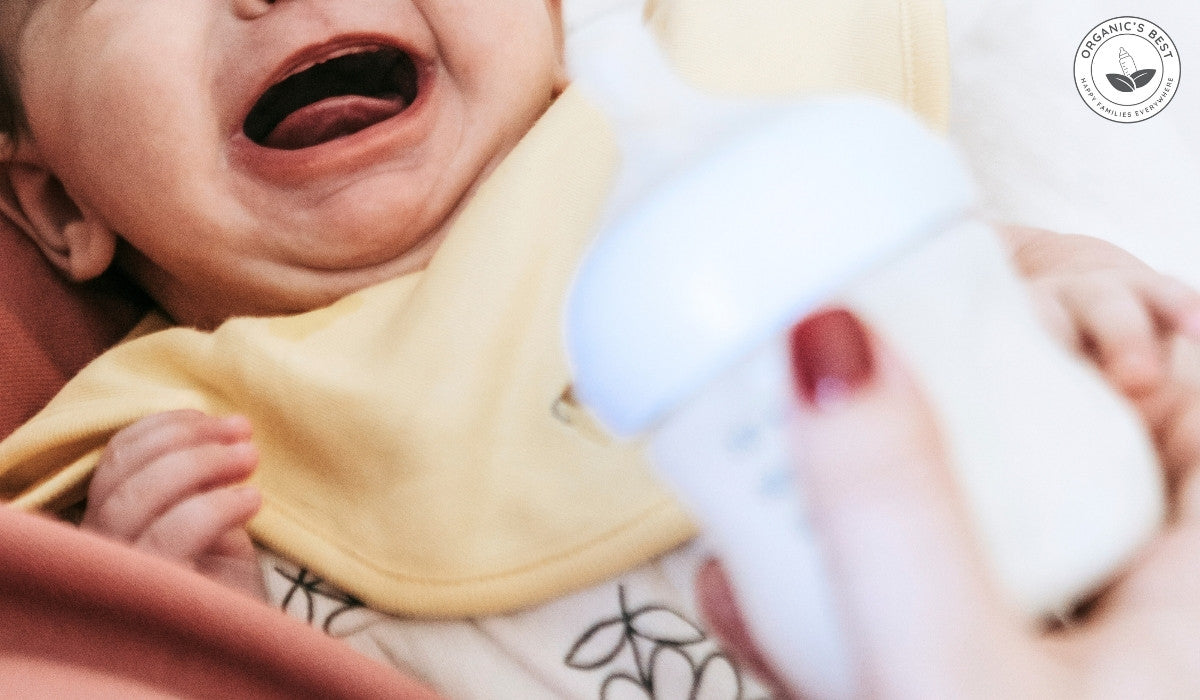Click to Get 2 FREE Boxes/Cans
Only New Customers! Click HERE to Get 2 Extra Boxes/Cans for Free With Your First Order.
BABY FORMULA
Offering new parents top-quality European infant formula from renowned brands like HiPP, Holle, Kendamil, and more. If you’re uncertain about which product to choose, our Formula Finder can help you make the best decision for your baby.
Baby Food
Offering new parents a premium selection of European baby foods, including jars, pouches, cereals, and snacks from esteemed brands like HiPP and Holle.
Signs Formula Doesn’t Agree With Baby
by Agustina Fernandez April 04, 2023 7 min read

We can all agree that one of the toughest parts about being a parent is not knowing the cause of your baby's discomfort or how to soothe them. To help you tackle this problem, we’re going to cover the signs formula isn't agreeing with your baby.
We'll also take a closer look at your baby's formula and why it might be making your little one fussy. Keep reading to find out how formula intolerance is diagnosed and treated and what steps you can take if your baby has a cow's milk allergy!
Table of contents
- Signs of Formula Intolerance
- Tips for Handling Your Baby’s Intolerance to Formula
- How to Know if Your Baby is Allergic to Their Formula
- What is a Cow's Milk Allergy?
- When Will You Know Your Baby is Having an Allergic Reaction to Formula?
- How Long Does an Allergic Reaction to Formula Last?
- What Are Some Baby Formula Options?
Signs of Formula Intolerance

It can be difficult to discern symptoms of a baby not tolerating formula. Inevitably, your baby will engage in crying, burping, and signs of fussiness that are part of the common array of baby behaviors. This can leave parents questioning the cause of these displays of discomfort.
Keep an eye out for the symptoms described below that may point to your baby's formula as the root of their discomfort.
Symptoms of Formula Intolerance
- Frequent crying and fussiness following feedings
- Noticeable weight loss or poor weight gain
- Extra reflux symptoms like excessive spit-up accompanied by trouble gaining weight
- Frequent diarrhea or persistent constipation
- Mucus or visible blood in stool
- Signs of allergic reaction like rash or hives
- Vomiting
In the case, your baby presents these symptoms, before considering switching formulas it's important to talk to your pediatrician.
Tips for Handling Your Baby’s Intolerance to Formula
Keeping a feeding log that you can share with medical practitioners can be very helpful in determining whether your baby has food allergies. This will help them to determine if there is a need to switch formulas due to symptoms of lactose intolerance, for instance.
You should record the time of your feedings and the onset of your baby’s symptoms along with how long they last. The more details you can provide, the more helpful it will be!
According to a BioMed Central report, parents often confuse common infant conduct with food intolerances. They caution against switching formulas unnecessarily and underscore the importance of consulting with your medical practitioner before embarking on any changes to their diet.
What Can I do To Comfort My Baby?
No parent likes to see their baby uncomfortable and distressed. There are a couple of tactics you can try to soothe your little one:
-
Avoid overfeeding your baby formula or breast milk
-
Burp your baby during feedings
-
Let your baby rest and digest after consuming formula
-
Encourage your baby to move for gas relief
How to Know if Your Baby is Allergic to Their Formula
Your medical practitioner will need to assess if your baby is experiencing a symptom of intolerance to formula or if your baby is allergic to milk. There is a significant difference between the symptoms that relate to formula allergy and how food intolerances manifest.
Food allergies occur when the immune system reacts to a specific food protein. A food allergy can present with symptoms such as a skin rash, facial flushing, itching, coughing, wheezing, or a swollen throat.
Allergic reactions are typically immediate but delayed reactions can also occur and include things like baby eczema, colic, diarrhea or constipation, and reflux. It is important to remember that an acute allergic reaction can be life-threatening.
Food intolerance, on the other hand, does not involve the immune system but instead irritates the digestive system. A lactose intolerance, for instance, is experienced as a result of lacking the enzyme (lactase) necessary to digest the milk sugar lactose.
People with lactose intolerance may experience things like bloating, nausea, and cramps when they ingest foods containing lactose such as cheese and other dairy products. However, these symptoms are common in infants, so it’s important to remember that a food intolerance can be one of many possible explanations.
What is a Cow's Milk Allergy?
The most common type of food allergy children experience in their first year is a cow’s milk protein allergy or CMPA. In the developed world, it is estimated that 2 -3 % of infants are affected by a cow’s milk allergy.
There are two types of CMPA that can cause a variety of symptoms. The classic cow’s milk food allergy is mediated through a protein called IgE that is produced by the immune system in reaction to germs. It is an antibody commonly found in the bloodstream making this type of allergy easy for practitioners to detect.
A blood test measuring IgE levels can suggest if your child may have an allergy, but it is not definitive. IgE allergy symptoms are also easier to detect as they present as typical symptoms of an allergy like a rash or facial swelling.
The second type of cow’s milk allergy, non-IgE CMPA, involves other elements of the immune system that typically relate to reactions in the gastrointestinal tract. This type of allergy is more difficult to diagnose with certainty.
Symptoms of non-IgE CMPA are often delayed and may include vomiting, diarrhea, blood in the stool, and fussiness after eating. The one way to assess if these common symptoms are truly because your baby is allergic to cow's milk is to eliminate all dairy from your baby’s diet to see if symptoms resolve and then reintroduce it after some time to observe if symptoms return.
When Will You Know Your Baby is Having an Allergic Reaction to Formula?
In addition to the different types of symptoms that emerge, the symptoms themselves may come on rapidly or slowly taking anywhere from hours to days to show up. Rapid onset symptoms include hives, mouth or throat swelling, wheezing or shortness of breath, and anaphylaxis.

Anaphylaxis is a life-threatening medical emergency that deserves special attention. Signs of anaphylactic shock will start soon after milk consumption and can include, laboured breathing and constriction of the airways, a swollen throat, facial flushing, and itching. It requires a swift visit to the emergency room where treatment will entail a shot of epinephrine.
Symptoms with a slow onset can include colic, diarrhea, abdominal cramps, or blood in the stool (source).

How Long Does an Allergic Reaction to Formula Last?
As described above, an allergic reaction can last anywhere from minutes to hours or even days depending on the type of allergy, the symptoms, and their severity.
The good news is the prognosis for CMPA in infancy and childhood is favourable. Many children with CMPA outgrow it; studies suggest that about 50% may develop a tolerance by one year of age, 75% by three years, and 90% by six years. So, if your infant is affected by CMPA, know that this may not be a lifelong affliction as it can change as babies grow and develop!
The two main proteins found in cow’s milk that can trigger an allergic reaction are whey and casein. When babies with CMPA ingest any products containing cow’s milk, the immune system triggers the production of antibodies, which can cause inflammation and harm tissues and organs in the body. Many people with CMPA may exhibit sensitivities to both casein and whey. Infants who are allergic to cow’s milk may need to be fed a hypoallergenic formula.
If CMPA is suspected, it is essential to consult with a medical practitioner right away. Since the symptoms of CMPA can be very similar to other conditions, it’s important to get an accurate diagnosis. While the doctor may recommend tests to rule out other causes of your baby’s symptoms, there is no single definitive test for CMPA.
Rather, there are several things the doctor may recommend to come to a diagnosis. This includes keeping a food diary as we mentioned above and eliminating cow’s milk for a period of time to see if the symptoms improve. Following up with your doctor is important to monitor your baby’s symptoms and ensure they are getting the adequate nutrition they need.
By the way, you might be interested in checking out our guide: The Best Hypoallergenic Baby Formulas
What Are Some Baby Formula Options?
Luckily, for formula-fed babies that suffer from sensitivities there are different formula options a pediatrician may recommend!
While some parents consider goat's milk formulas as an alternative, it's important to consult a pediatrician, especially for babies with cow's milk sensitivities, as goat's milk protein is similar to cow's milk protein and may also trigger reactions.
Although goat's milk is sometimes considered for babies with sensitivities, it is generally not recommended for infants with CMPA due to the similar protein structures to cow's milk, which could also trigger an allergic reaction.

HiPP HA formulas with extensively hydrolyzed proteins are often considered for babies with a family history of eczema or sensitivities to milk protein, but they may not be suitable for babies diagnosed with CMPA, as they still contain cow's milk proteins that could cause an allergic reaction.
HiPP’s HA formula features extensively hydrolyzed milk proteins to minimize allergens, available in Dutch and German versions. These proteins undergo hydrolysis to simplify them, ensuring nutrition while reducing allergy risks. The formula contains lactose, mimicking breast milk's natural composition, and is bolstered with probiotics, prebiotics, and essential fatty acids like DHA and ARA.
Free from artificial sweeteners, GMOs, gluten, soy, HiPP has crafted this formula to support your baby's growth. They offer various stages: Stages PRE and 1 (0-6 months) and Stage 2 (6-12 months), complementing or substituting breast milk as solids are introduced.
Conclusion
It can be difficult to determine if your baby is allergic to formula. Signs your baby doesn't like their formula are varied and often manifest as common behaviours among babies. The key takeaway is to discuss these symptoms with your pediatrician to rule out a cow's milk allergy and assess what formula is best for your baby.
Disclaimer:
Please be aware that this information is based on general trends in babies, and it is not medical advice. Your doctor should be your first source of information and advice when considering any changes to your child’s formula and when choosing your child’s formula. Always consult your pediatrician before making any decisions about your child’s diet or if you notice any changes in your child. Breastfeeding is the best nutrition for your baby because breast milk provides your child with all the essential nutrients they need for growth and development. Please consult your pediatrician if your child requires supplemental feeding. |
Agustina Fernandez
Dr. Agustina Fernandez earned her medical degree from the prestigious Universidad Nacional de Córdoba, Argentina. With a deep-rooted passion for pediatrics, Dr. Fernandez is currently on the path to specializing in children's healthcare. Recently, she has delved into the vital field of infant nutrition. Her research interests include breastfeeding, infant formula, and baby food in little ones’ formative years. Dr. Fernandez's commitment to this area of study underscores her dedication to ensuring the health and well-being of children from their earliest days.
Leave a comment
Comments will be approved before showing up.
Also in Organic Infant Nutrition and Health Blog

Influenza in Babies: What to Watch for Flu Symptoms in Kids
by Agustina Fernandez January 20, 2026 9 min read
Read More
Infant Botulism: Symptoms, Causes, and Safety Tips for Parents
by Agustina Fernandez January 13, 2026 8 min read
Read More
10 Winter Activities for Kids and Toddlers
by Agustina Fernandez January 06, 2026 8 min read
Read More
Reviewed by Dr. Po-Chang Hsu, MD, MS
-

Dr. Po-Chang Hsu: Medical Reviewer of Organic's Best Blog
Dr. Hsu received his medical degree from Tufts University in Boston, Massachusetts, and holds a Master’s of Science degree from both Harvard University and Tufts University.
